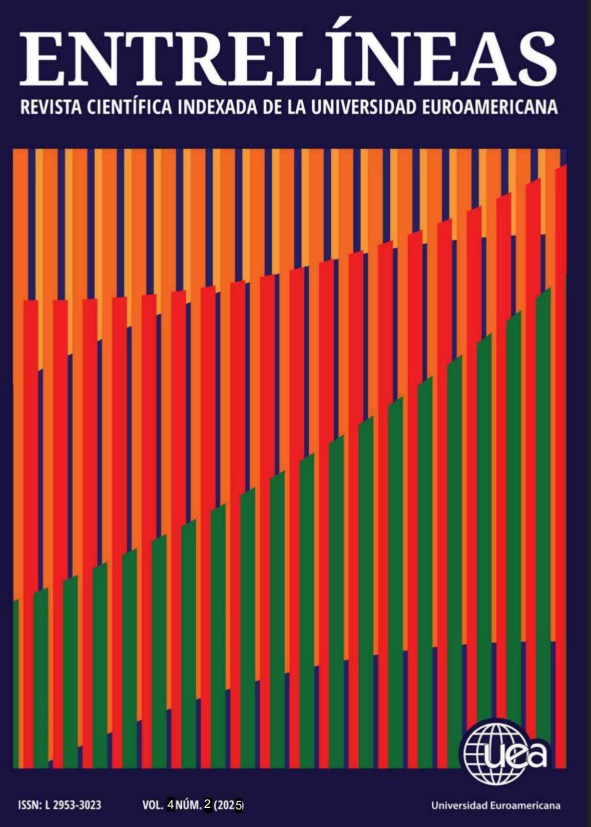Administration of the solidarity economy in the social life of individuals
DOI:
https://doi.org/10.56368/Entrelineas423Keywords:
financial administration, administrative operation, cooperativesAbstract
This article addresses the social and solidarity economy as an alternative to the traditional economic model, as it places people and the environment at its center. The objective is to examine the historical evolution of the management of this economy and its impact on the social lives of individuals from 1945 to the present. To achieve this objective, a qualitative study was conducted with a documentary and descriptive design. The research was based on the review and analysis of documentary sources and case studies, using 26 sources. The research identified several stages, beginning with the role of unions and collective bargaining in the postwar period (1945-1975); subsequently, in the 1960s and 1970s, self-management movements emerged that challenged the capitalist model. During the 1980s, worker takeovers of bankrupt companies became popular, transforming them into cooperatives, first in Europe and then in South America. Finally, the resurgence of the popular economy in Latin America as a response to crises was analyzed, highlighting the organization of recyclers in Colombia. It is concluded that the popular economy has gained legitimacy and is no longer seen as a mechanism for managing poverty. However, doubts persist about its capacity to evolve from subsistence to forms of accumulation, revealing a divide between efficiency and solidarity.
Downloads
References
Alguacil Gómez, J. (2007). Nuevos movimientos sociales: nuevas perspectivas, nuevas experiencias, nuevos desafíos. Polis. Revista Latinoamericana, (17), 1-33. https://journals.openedition.org/polis/4554?lang=pt
Asociación Nacional de Recicladores de Colombia. (2025). Nota pública. https://asociacionrecicladoresbogota.org/asociacion-nacional-de-recicladores-de-colombia-anr-nota-publica/
Balcázar Nava, P., González-Arratia López-Fuentes, N. I., Gurrola Peña, G. M., & Moysén Chimal, A. (2013). Investigación cualitativa. Ministerio de Educación del Perú. https://repositorio.minedu.gob.pe/handle/20.500.12799/4641
Bárcena, A., & Prado, A. (2016). El imperativo de la igualdad: por un desarrollo sostenible en América Latina y el Caribe. Siglo Veintiuno, Naciones Unidas, CEPAL. https://biblioteca-repositorio.clacso.edu.ar/libreria_cm_archivos/pdf_1587.pdf
Castel, R. (1995). Las metamorfosis de la cuestión social: una crónica del asalariado. Fayard. https://catedracoi2.wordpress.com/wp-content/uploads/2013/05/castel-robert-la-metamorfosis-de-la-cuestic3b3n-social.pdf
CEPAL. (2023). Década de 1980: crisis de la deuda. 75 años de la CEPAL y el pensamiento cepalino. https://biblioguias.cepal.org/CEPAL75/decada80#:~:text=La%20profunda%20crisis%20econ%C3%B3mica%20y,a%C3%B1os%20%E2%80%9Cla%20d%C3%A9cada%20perdida%22.
Chaves, R., Monzón, J.L. & Sajardo, A. (2003). Elementos de economía social. Universidad de Valencia.
Cooperativa de Trabajo Asociado, Reciclaje y Servicios Coopreser, Ltda. (2025). Reseña. https://www.faae.org.co/premios-nacionales/solidaridad-2005-cooperativa-de-trabajo-asociado-reciclaje-y-servicios-coopreser-ltda/
Coordinamento di Iniziative Popolari di Solidarietà Internazionale. (2015). CIPSI - Coordinamento di Iniziative Popolari di Solidarietà Internazionale. https://www.redattoresociale.it/article/i_numeri/cipsi_-_coordinamento_di_iniziative_popolari_di_solidarieta_internazionale
Defourny, J. (1990). L´émergence du secteur d´économie sociale en Wallonie. Cooperatives et Déveloement, 23(1), 151-175. https://orbi.uliege.be/bitstream/2268/90532/1/L
Hamari, J., Sjöklint, M., & Ukkonen, A. (2015). The sharing economy: Why people participate in collaborative consumption. Journal of the association for information science and technology, 67(9), 2047-2059. 10.1002/asi.23552;
https://papers.ssrn.com/sol3/Delivery.cfm?abstractid=2271971
Hernández Sampieri, R. & Mendoza, C. (2018). Metodología de la investigación. Las rutas cuantitativa, cualitativa y mixta. Editorial Mc Graw Hill.
Instituto de Estadística y Cartografía de Andalucía. (2012). Economía social y solidaria. Junta de Andalucía. https://www.juntadeandalucia.es/institutodeestadisticaycartografia/InformacionEstadisticayCartografica/RevistaEconomia_Social.pdf
Kyriakopoulos, K. (2000). La orientación al mercado de las organizaciones cooperativas: estrategias y estructuras de aprendizaje para la integración de la firma y sus socios. Uitgeverij Van Gorcum.
Larraín, F. (2017). Oportunidades perdidas: La historia económica de América Latina. En Fondo Monetario Internacional. https://www.imf.org/es/News/Articles/2017/10/05/NA100517-Missed-Opportunities-The-Economic-History-of-Latin-America#:~:text=A%20partir%20de%20la%20d%C3%A9cada,de%20convertirse%20en%20pa%C3%ADses%20industrializados.
Laville, J. L. (2009). A economia solidária: um movimento internacional. Revista crítica de ciências sociais, (84), 7-47. 10.4000/rccs.381
Laville, J.-L. & García Jané, J. (2009). Crisis capitalista y economía solidaria. Una economía que emerge como alternativa real. Icaria.
Laville, J.-L. (2010). The solidarity economy: an international movement. RCCS Annual Review. A selection from the Portuguese journal Revista Crítica de Ciências Sociais, (2), 1-41. https://doi.org/10.4000/rccsar.202
Loaiza Cárdenas, J. E. (2014). Economía solidaria: un nuevo enfoque de la economía alternativa. https://www.economiasolidaria.org/noticias/economia-solidaria-un-nuevo-enfoque-de-la-economia-alternativa/
Meyer, J. & Rowan, B. (1977). Institutional Organizations: Formal Structure as Myth and Ceremony. American Journal of Sociology, 83, 340–363. https://omran.dohainstitute.org/ar/043/Documents/Omran-43-2023-Meyer-Rowan.pdf
Monje-Reyes, P. (2011). Economía solidaria, cooperativismo y descentralización: la gestión social puesta en práctica. Cadernos Ebape. br, 9, 704-723. https://doi.org/10.1590/S1679-39512011000300003
Pérez de Mendiguren, J.C. & Etxezarreta, E. (2015). Sobre el concepto de economía social y solidaria: aproximaciones desde Europa y América Latina. Revista de Economía Mundial, 40, 123-143. https://www.redalyc.org/pdf/866/86641407006.pdf
Polanyi, K. (2007). La gran trasformación. Los orígenes políticos y económicos de nuestro tiempo. Buenos Aires: Fondo de Cultura Económica.
Quijano, A. (1998). La economía popular y sus caminos en América Latina. Mosca Azul Editores.
Razeto, L. (1993). Centralidad del trabajo y economía de solidaridad. Economía Solidaria–Campus Virtual. http://economiassolidarias.unmsm.edu.pe/sites/default/files/Centralidad_del_Trabajo_y_Economia_de_Solidaridad.pdf
Utting, P., Van Dijk, N., & Matheï, M. A. (2014). Social and solidarity economy: Is there a new economy in the making? (No. 10). UNRISD Occasional Paper: Potential and Limits of Social and Solidarity Economy. https://cdn.unrisd.org/assets/library/papers/pdf-files/op10-utting-et-al.pdf
Valdivieso, J. (2010). La globalización del ecologismo. Del ecocentrismo a la justicia ambiental. En Ecopolítica. https://ecopolitica.org/la-globalizacion-del-ecologismo-del-ecocentrismo-a-la-justicia-ambiental/
Downloads
Published
Issue
Section
License

This work is licensed under a Creative Commons Attribution-NonCommercial 4.0 International License.
You are free to:
- Share — copy and redistribute the material in any medium or format
- Adapt — remix, transform, and build upon the material
- The licensor cannot revoke these freedoms as long as you follow the license terms.
Under the following terms:
- Attribution — You must give appropriate credit , provide a link to the license, and indicate if changes were made . You may do so in any reasonable manner, but not in any way that suggests the licensor endorses you or your use.
- NonCommercial — You may not use the material for commercial purposes .
- No additional restrictions — You may not apply legal terms or technological measures that legally restrict others from doing anything the license permits.










